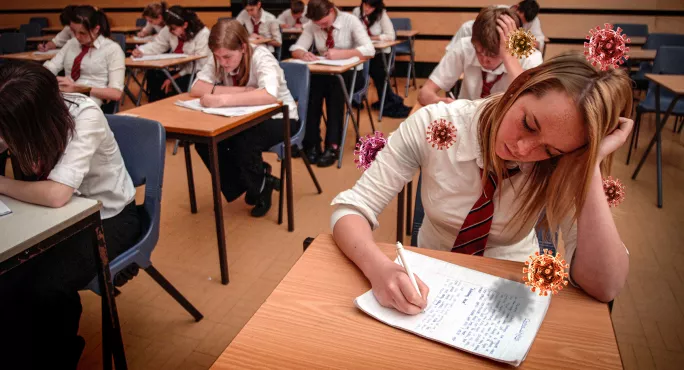
GCSEs 2022: Long Covid could spark exam exemption, says JCQ

Schools that have students with long Covid who are taking their GCSE and A-level exams this summer will be able to apply for a special consideration exemption if the condition worsens during the exam period, ░š▒▓§╠²has learned.
TodayŌĆÖs clarification of how the guidance applies to the illness from the Joint Council of Qualifications (JCQ) ends months of uncertainty over whether long Covid would be counted as a special consideration reason for a student to miss an exam and receive alternative assessment.
Although long Covid will remain classed as an ŌĆ£ongoing conditionŌĆØ, which means students who have been diagnosed with the chronic illness must sit the exam as long as the school has made suitable adjustments known as ŌĆ£access arrangementsŌĆØ,╠²░š▒▓§╠²understands that, if the pupilŌĆÖs condition worsens╠²around the time the exam is taking place, their school could apply for them to sit out the exam under special consideration rules.
- ▒╩░∙Š▒│Š▓╣░∙▓Ō:╠²Primary pupils with long Covid more likely to have poor mental health
- Long Covid:╠²Education is joint top sector affected by long Covid
- Feature:╠²Why every school needs to worry about long Covid
- Sats: No ŌĆśspecial considerationŌĆÖ for Covid
The JCQ has clarified that the current guidance, which says special consideration cannot apply to students with a long term illness or other difficulties during the course, ŌĆ£unless the illness or circumstances exacerbate what would otherwise be a minor issue at the time of the assessmentŌĆØ, will also apply to students struggling with long Covid.
It said that schools could apply for special consideration for a student who is ŌĆ£having repeated difficulty maintaining concentration during examinationsŌĆØ despite having ŌĆ£previously approvedŌĆØ adjustments, such as supervised rest breaks.
A JCQ spokesperson said a doctorŌĆÖs note would not be needed to support the application as the fact that a student is struggling within an exam or over the course of a series would be ŌĆ£evident to the invigilation teamŌĆØ.╠²
Long Covid symptoms include fatigue, post-exertion malaise, loss of smell, shortness of breath and difficulty concentrating, as well as gastrointestinal problems.
The severity of these symptoms and the number of symptoms that each person suffers from can vary.
Special considerations exist for exam candidates who have temporarily experienced illness, injury or some other event outside of their control at the time of the assessment.
They can be applied when ŌĆ£the issue or event has had, or is reasonably likely to have had, a material effect on a candidateŌĆÖs ability to take an assessment or demonstrateŌĆØ their ŌĆ£normal level of attainment in an assessmentŌĆØ.
The JCQ has stressed that students with long Covid would only be eligible for special consideration status if╠²previously approved access arrangements - as formulated and set out by the schoolŌĆÖs Sendco - cannot alleviate the candidateŌĆÖs emerging medical condition. ╠²
Access arrangements might include taking the exam in a different room, being able to take rest breaks, extra time or completing the examination from home.
A spokesperson for JCQ told ░š▒▓§╠²that it ŌĆ£appreciatesŌĆØ that some students sitting exams this summer ŌĆ£may, unfortunately, continue to suffer from long CovidŌĆØ and that Sendco staff ŌĆØshould determine appropriate and reasonable adjustments based on their knowledge of the candidateŌĆÖs impairment, its effect upon teaching and learning, and the candidateŌĆÖs normal way of working in timed assessmentsŌĆØ in line with ŌĆ£any long-term medical conditionŌĆØ.╠²
ŌĆ£Special consideration would only be relevant if the candidateŌĆÖs condition worsened at the time of the examination(s), and/or the candidateŌĆÖs condition manifests itself at the time of the examination and previously approved access arrangements cannot alleviate the candidateŌĆÖs emerging medical condition,ŌĆØ the spokesperson said.╠² ╠²
They added: ŌĆ£For example, despite having a prompter and/or supervised rest breaks, the candidate is having repeated difficulty maintaining concentration during examinations, which is evident to the invigilation team.
ŌĆ£Alternatively, the candidate is suffering more and more from fatigue as the examination series progresses. Under these circumstances, the centre would have sufficient evidence of the candidateŌĆÖs difficulties to apply for special consideration, and a note from a GP would not be necessary.
ŌĆ£JCQ and the exam boards have sought to mitigate this by spacing exams at least 10 days apart, though do appreciate some cases require further support. This process has been put in place to help support students in the fairest, most effective way possible.ŌĆØ
Earlier this month, the JCQ updated its guidance on how exams should be run for Covid-positive pupils, saying╠²that pupils with a high temperature should not come to school to sit exams.
The update highlighted guidance from the UK Health Security Agency (UKHSA), which says children with mild symptoms, such as a runny nose, sore throat or slight cough, can continue to attend their education setting, but that those who are unwell and have a high temperature should stay at home and avoid contact with other people.
Earlier this week, updates to the Standards and Testing Agency (STA) special considerations guidance╠²for key stage 2 confirmed that╠²Covid-related special consideration will only apply when a pupil has suffered a bereavement owing to the virus within 12 months of taking the test.
You need a Tes subscription to read this article
Subscribe now to read this article and get other subscriber-only content:
- Unlimited access to all Tes magazine content
- Exclusive subscriber-only stories
- Award-winning email newsletters
- Unlimited access to all Tes magazine content
- Exclusive subscriber-only stories
- Award-winning email newsletters
You need a subscription to read this article
Subscribe now to read this article and get other subscriber-only content, including:
- Unlimited access to all Tes magazine content
- Exclusive subscriber-only stories
- Award-winning email newsletters
- Unlimited access to all Tes magazine content
- Exclusive subscriber-only stories
- Award-winning email newsletters
topics in this article



